„Oczyszczać Partię z elementów wrogich i obcych…”. Wojewódzka Komisja Kontroli Partyjnej Polskiej Partii Robotniczej w Lublinie w latach 1945–1948
“Cleanse the Party of alien and hostile elements…” Provincial Commission for Party Control of the Polish Worker’s Party in Lublin in 1945–1948
Author(s): Michał BednarczykSubject(s): Political history, Social history, WW II and following years (1940 - 1949)
Published by: Instytut Pamięci Narodowej
Keywords: Provincial Commission for Party Control; Polish Workers’ Party (PPR); Polish Workers’ Party Provincial Committee in Lublin; Polish History 1944–1956; organs of party control
Summary/Abstract: Polish Workers’ Party (PPR) – during the Second World War a cadre underground organization with several hundred members, transformed into Polish United Workers’ Party (PZPR) – a mass party which gathered at the end of the 1970s – in its peak period – more than 3 million people. The methods by which Polish Worker’s Party controlled the actions and ideological level not only of their activists, but also its bodies at all levels are certainly worth considering – it were the Commissions for Party Control that were responsible for maintaining that control. The Lublin region was a special area for the communist activity. As early as in the interwar period communist parties developed in that region and it was a convenient area to organize the Communist resistance movement during the Second World War. Note that it was the region where the first “people’s” government was assembled. The aim of the article is to present the Provincial Commission for Party Control in Lublin, established in June 1945, in all aspects of its operations. Before going into detail about the Lublin Provincial Commission for Party Control, we need to take a look at the Central Commission for Party Control. The analysis of the Provincial Commission for Party Control’s activities focused on its development, composition, performed tasks, rules and effects of its works. All its employees had a very long party experience, reaching as far back as the interwar period, they cooperated with Communist Party of Poland, Communist Party of Western Ukraine or People’s Guard/Peoples’ Army. Members who were not employees of the Party were recruited from among people who joined Polish Worker’s Party after 1944, however they did not play a major role. The main field of Provincial Commission for Party Control activity was to punish the Polish Worker’s Party members for the offenses. Therefore it is of great interest to analyse the statistical records of cases of party-led investigations against members of the party committing offenses. The sociological approach to the problem allows showing how far Polish Worker’s Party activists differed from the promoted image of the “new man”. These deliberations help finding an answer to the question whether the committee fulfilled its task to punish activists, as well as control the functioning of the party institutions. A secondary issue is whether Provincial Commission for Party Control was a tool of factional struggles within the Provincial Commission of the Polish Worker’s Party.
Journal: Pamięć i Sprawiedliwość.
- Issue Year: 27/2016
- Issue No: 1
- Page Range: 327-367
- Page Count: 41
- Language: Polish

